Traveling as a dual citizen and using two passports is one of the major benefits of having Thai dual citizenship.
While a Thai passport alone ranks in the middle of the field in terms travel freedom it provides (57 out of 96 according to the passport index website) when combined with having a western passport (which are generally ranked in the top 10), it is literally a ‘best of both worlds’ situation.
While western passports general provides visa free access to most western countries, the Thai passport is highly useful for traveling around the ASEAN bloc. Countries such as Myanmar, Indonesia, Laos, Vietnam and Cambodia normally require paid visas from western passport holders, but generally allow automatic 30-day entry for Thai nationals. Add to that some outliers – Russia for instance allows Thai’s to enter visa free, while charging Americans, Australians and British up to $140 per single entry visa – having a Thai-western dual citizenship combination is very handy from a travel perspective.
General rules
There are couple of guiding principals to using when traveling as a dual citizen which can minimize hassles.
Traveling
Always enter and exit a country on the same passport. This is particularly true around Asia, where immigration officials are particularly stamp happy and have strict immigration controls on arrivals and departure. If you enter Singapore on a certain passport, you need to depart on it, so immigration records are complete.
Always use a Thai passport to enter Thailand
Avoid using your non-Thai passport to enter the country, otherwise upon entry into Thailand you will be subject to immigration rules and limits on your stay. Thailand WILL treat you as a foreigner for immigration purposes if you enter on non-Thai passport, and you will need to apply for extensions of stay, 90 day reporting and overstay fines if your stay exceeds your granted time.
There is a misplaced concern, particularly among Thai passport holders, that traveling as a dual citizen is frowned upon or illegal in Thailand. Scared to use their Thai passport, they will instead enter Thailand on their foreign passport. Dual citizenship hasn’t been illegal since 1992 in Thailand and we discuss this this article (‘Thai dual citizenship – is it legal?’) the ins and outs of Thailand’s approach to dual citizenship.
How to travel with two passports
A good example on traveling as a dual citizen is outlined below. This is for a hypothetical trip between Bangkok and Sydney.
At check-in
Show both Thai and Australian passports to the airline check. The Australian passport let the airline know you have the right to enter Australian without a visa and will issue you with a boarding pass.

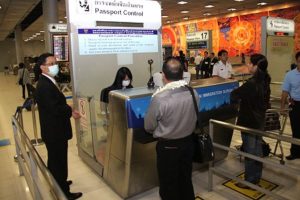
- Photo credit: Richard Barrow
At Thai immigration
Pass through either the manual desks or e-gates, showing your boarding pass and Thai passport.
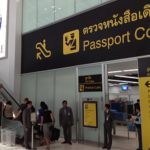
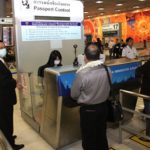

On arrival at destination
Upon arriving in Australia, you wont need your Thai passport for this portion of the journey. Simply pass through immigration using the Australian passport.


On the return journey, repeat the above process, exiting Australia using the Australian passport and re-entering on the Thai passport. Obviously, the process is similar for people traveling to the EU, UK, North America and other destinations where using a western passport is more advantageous that a Thai one.
Frequently Asked Questions
Q: I was born outside of Thailand, what happens when I come to Thailand the first time?
A: Many Thai citizens are born outside of Thailand these days, so it is extremely common for people to be entering the first time on an unused Thai passport issued from an embassy overseas. You have two options generally: use the auto gates, where you can simply be scanned in automatically without an immigration officer, or if traveling with Thai citizen children, enter the Thai passports lane to be stamped in by an immigration officer.
Q: But don’t Thai immigration they look for exit stamps from the country I have just traveled from?
A: At major airports, when flying in, Thai immigration officials don’t look for stamps from where you have just traveled from. This is for a variety of reasons. Firstly, many countries, Australia, Singapore, HK, the UK and the US either don’t stamp passports when departing, or they don’t have formal immigration checks when you leave. So Thai immigration officers aren’t going to be looking out for stamps.
Q: I’ve heard horror stories however of people traveling to Thailand for the first time on a fresh Thai passport, and an immigration officer refuses to let them in on their Thai passport and make them use their foreign one.
A: Unfortunately, this has been known to happen, as some junior immigration officers simply don’t know their own rules. Traveling as a dual citizen isn’t illegal! Fortunately, this is a rare occurrence these days with the advent of the auto-gates for Thai passport holders which allow you to enter and exit without the need of even interacting with an immigration officer.
Nevertheless, if you do come across an immigration officer who is being difficult, ask to speak to a superior. They will certainly know the rules much better and normally this problem has always been solved by asking for assistance from a superior.
It is also worth understanding the Thai constitution on this matter, which clearly states:
Section 39 No person of Thai nationality shall be deported or prohibited from entering the Kingdom. Revocation of Thai nationality acquired by birth of a person shall not be permitted.
มาตรา ๓๙ การเนรเทศบุคคลสัญชาติไทยออกนอกราชอาณาจักร หรือห้ามมิให้ผู้มีสัญชาติไทย เข้ามาในราชอาณาจักรจะกระทำมิได้ การถอนสัญชาติของบุคคลซึ่งมีสัญชาติไทยโดยการเกิด จะกระทำมิได้
Q: I entered Thailand on my non-Thai passport. What can I do to stay longer term?
A: It depends on your circumstances and intent. If you are here less for 30 days, then there is no issue. You’ll simply leave Thailand at the end of your stay, but obviously have to use the foreign passport line when you depart.
If you are planning to stay longer and want to avoid overstaying, you unfortunately can not ‘switch’ your entry stamp between your foreign and Thai passports at a local immigration office. Many have tried with no success. Given this you have two options:
- Depart Thailand using your foreign passport and re-enter on your Thai passport. If you have any overstay penalties, you’ll need to clear those before you board your flight. For a quick turn-around, you can fly to a neighboring country, leaving Thailand on your foreign passport, and then on the way back, re-enter on your Thai one and there will be no restriction on your stay.
- Extend your stay in Thailand using your foreign passport. Section 2.23 of police order 777/2551 (i.e. the immigration rules) states that: “In the case of a person who used to have Thai nationality or whose parent is or was of Thai nationality visiting relatives or returning to his or her original homeland: Each permission shall be granted for no more than one year”.
Again however, if you decide to remain in Thailand using this method, you’ll be subject to immigration rules for things like 90-day reporting, further extensions and overstay, and be necessitated to travel in person to immigration and pay the applicable fees. We’ve outlined this article: Thailand ancestry visas.
Q: If I do a passport swap – which is the best way, by air or land?
A: Swapping passports mid-air is the recommended. As explained earlier, immigration officials at airports don’t keep tabs on ‘stamp trails’ in passports.
It is a different story with crossing Thailand’s land borders unfortunately – where traveling as a dual citizen becomes very difficult. Officials at the border (whether it be Myanmar, Laos, Cambodia or Malaysia) will want to see stamps showing you left Thailand. And they will want to see it in the same passport. Malaysia, as an added bonus, doesn’t even recognize the concept of dual nationality, so they may even refuse you entry if you tried to swap passports at a land border.
Coming back into Thailand, officials at land borders are pretty strict at insisting on stamping you into Thailand on whatever passport you left the last country on. People have tried, and succeeded, but generally they get pretty sticky on the issue. If you rate your debating skills, by all means do so. But a safer bet is just to fly in and out of the country to do a passport swap. It is the path of least resistance and doing so on a Low-Cost Carrier such as Air Asia means it need not be an expensive exercise either.
Q: I’m traveling out of Thailand to a western country. I will use my western passport to enter that country. Will the fact I have no visa in my Thai passport be an issue for Thai immigration at the airport?
A: No, it won’t be an issue for immigration. It is the airline who need to see that you have the right to enter the destination country visa free. Without proof of this, they won’t issue a boarding pass.
For single passport holders, a visa for the destination country (or the right to enter visa free) is proof that you are entitled to travel.
When checking in, simply show BOTH passports to the airline check-in desk. They will know from your western passport that you can enter the destination country without a visa. They will then issue you with a boarding pass.
Proceed to immigration and use your Thai passport and your recently issued boarding pass to pass through immigration.
Q: My kids have Thai dual citizenship and are born in Thailand. Which passports should they use for travel?
A: Always use the Thai passport to depart and re-enter Thailand. Use the western passport for travel to places where Thai’s need visas to travel otherwise. However, the Thai passport does allow visa free travel around SE Asia, Japan, Korea, Russia, so it is fine to use the Thai passport to destinations such as those if you wish.
Q: I am still worried about using both passports when I travel. Is it okay if I only use my Thai one for travel?
A: Traveling only on your Thai passport is perfectly acceptable in most cases. The onus on you will be however to get the correct visa before you travel – if they are required for Thai passport holders. Often this is a costly exercise and requires a visit to the embassy of the destination country.
However, do note that some western countries, Australia and the US come to mind, won’t issue you with a visa if you are also a citizen of those countries. Australia and the US require their own citizens to enter their countries on their Australian and US passports, respectively.

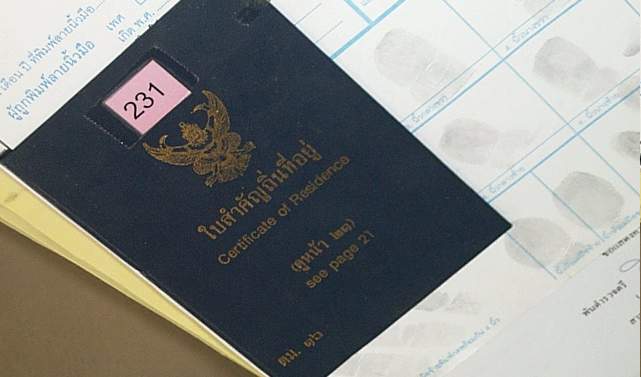
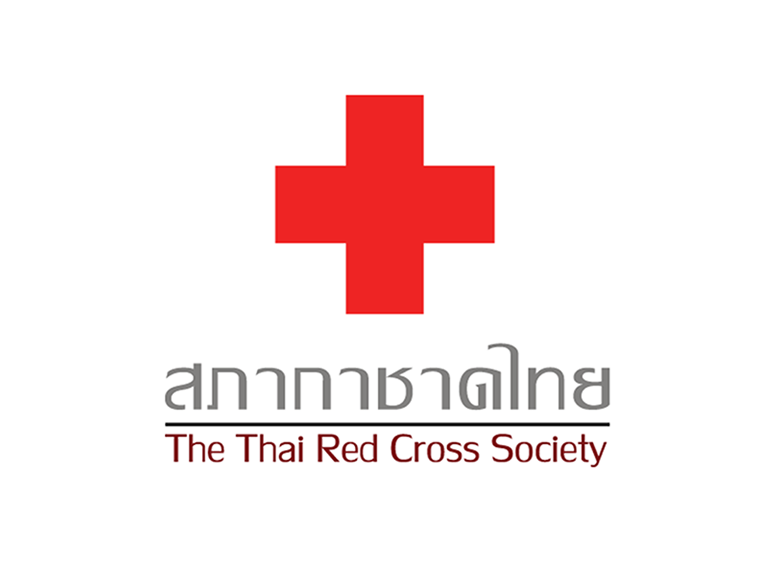

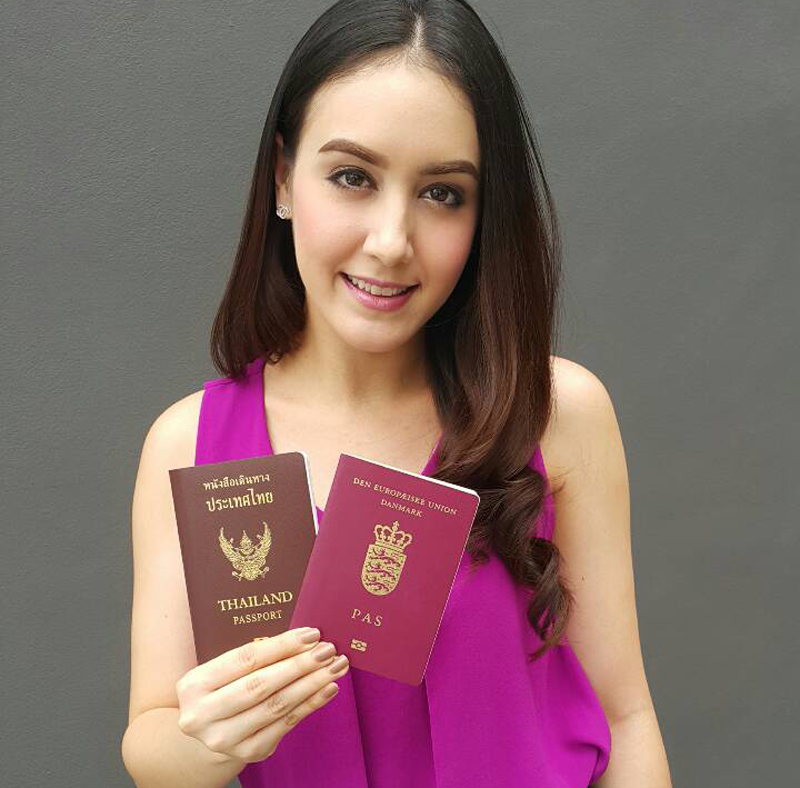



Hi, don’t do what I did.
My adopted Thai son has now dual citizenship but when flying from Bangkok to Dublin he was not allowed to board his plane by Thai immigration as he didn’t have his Thai passport with him (had only applied for that the day before) and could not leave the country with his new Irish passport.
Now I just want to confirm something.
Next week he will fly again with his two new passports. I understand that he should use the Thai passport to go through Thai immigration and the Irish passport for Irish immigration but will he have any problems at either end of the trip with the fact that both passports are brand new I.e without any stamps?
Hi there.
So I’m assuming your son just misunderstood things. What passport did he enter Thailand on?
– If he entered on his Irish passport he has to leave on that passport.
– If he entered on his old Thai passport, got a new one here, and then was hoping to leave then he needs to wait till his new Thai passport is ready (a new PP takes 3 days to be ready, one day if you pay the express fee). Immigration won’t let him exit on his Irish passport if he didn’t first enter Thailand on it.
Show BOTH passports to airline check in to show he doesn’t need a visa for re-entering the EU.
Show ONLY ONE passport to immigration, depending on how he entered.
Hope this clears things up.
Hi, I have Thai and foreign passport when I have moved here to thailand I entered with the foreign passport. Two years later after I got a Thai passport official I been going to Thai immigrant to extend my stay for 1 year and report the 90 days for the last 10+ years . When I told my mother the my situation she was shocked, she told me why am I stilll using this method now that I have Thai passport. In my mind I’m thinking to myself you idiot you can’t just swap mid way and expect their computers don’t keep tabs. I want to confirm if I leave Thailand do I use the same passport that I came in with and re-enter the Thai passport? And also what if I swap mid way using the Thailand passport but if I decide to use USA passport to travel ( assume it hasn’t been check out) is there a consequence. Thank you
So next time you fly out of Thailand just depart in your foreign passport and re enter on your thai passport. There is absolutely no problem in doing this.
i have a new foreign passport ive renewed can i swap that in between now with the current one that i have while im in thailand and leave out of thailand with the thai passport and re-enter thailand using the new foreign passport? in other word, would their computer data show i haven’t checked out with the current passport (old one). This part is kinda of grey area so im confused about this. thank you.
Sorry, this is confusing, you have a foreign passport and Thai passport, but want to enter Thailand on your foregin passport?
Whatever the case – always exit Thailand on the passport nationality you entered on. That is the strict rule for every situation. If you entered on your foregin, got a new foregin passport while you were here from your embassy – then you need to exit on that.
“sorry this is confusing, you have a foreign passport and thai passport, but want to enter thailand on your foreign passport”. let me clarify it better i’ve entered thailand on 2013 and 2 year later i got a thai passport since then i been here and I’ve been renewing my visa at thai immigration each year and doing the 90 days report. My Foreign passport expire 2024 of september of this year and i received my new foreign passport of this month of March. SO…my question is what ever passport i entered originally do i have to exit out the same passport that i entered in and come enter back in with the thai passport to clear our my foreign passport entry?. Thank you hope that make sense.
thanks for the clarification. The simplest way is yes – exit on your foreign passport and then return on your Thai passport. That keeps it simple and will close out your various stays.
I think you will find the section quoted 39 quoted is actually article 34
Nope – definitely section 39. https://www.admincourt.go.th/adminCourt/upload/webcmsen/Publication/Publication_021220_132718.pdf
Hello,
I entered Thailand on my foreign passport. During my stay here I received my Thai passport. Now I am wondering on which passport I should leave Thailand.
My mother told me I should leave with the Thai passport, so that next time I enter Thailand, there won’t be any issue, as there will be a proof in my Thai passport that I left Thailand.
However I don’t like the idea of letting my foreign passport in overstay, in the case they might figure out and match my names.
What is the best way out of Thailand in this case?
Also is it possible to show directly both passports at the border, so that they close the stay in my foreign passport and acknowledge the departure on my Thai passport?
Thank you, and happy Christmas
You’ll need to close the stay on your foreign passport. The simplest way is just to leave on it and then return on the thai one. People don’t follow stamp trails any more. However if you plan on staying an extended amount of time before you travel you can easily get this special visa in your foreign passport https://www.thaicitizenship.com/thai-ancestry-visas/
Thank you so much for your fast reply!! I really appreciate!
Happy New Year
If my mum has overstayed by 4 years on her UK passport but also has a thai passport now is there any risk of her deporting her or detaining her at the airport or can she simply leave on her uk passport, pay the overstay fee, stay for one night in Cambodia and then return on the thai passport? Every lawyer we’ve consulted has told her to just forget about the uk passport and just leave on the thai but that doesn’t feel good to us and we are worried down the line there might be a problem if her name is flagged in the system or something.. i trust your advice and would love to know what you think. Thank you
Hi,
So first thing to understand – don’t try a land crossing to do a passport swap. Generally they aren’t possible. So she’ll have to fly.
Second thing – as far as I can’ tell, the Thai immigration computer system is 50/50 with whether they ‘catch’ Thai dual citizens entering on the foreign passport and then trying to leave on the Thai passport.But given biometrics are getting better, I suspect more and more the system will get better.
A couple of thoughts.
1) She can *try* to exit Thailand on her Thai PP and FLY to a neighboring country and then return. You should do all of this on a Thai passport. If there isn’t any issue leaving Thailand, you’ll know that the immigration computer system hasn’t cross-referenced her, you can take the advice of the lawyers and ‘forget’ about the UK passport (so long as she never uses it again in Thailand).
2) If that doesn’t work, and the immigration system HAS cross referenced her two passports and biometrics, be prepared with the UK passport (don’t show it until asked!) and have the 20,000 baht ready to pay the overstay fine. Normally, a foreign citizen would also get black listed for being overstay for so long, but at that point make it known that your mum is also a Thai citizen and the blacklist will become impossible given you can’t ban Thai citizens from entering Thailand. She’ll still have to pay the fine, but when she returns, she can enter on her Thai passport without an issue.
A quick trip to say KL or Singapore and back on Air Asia will be fine to achieve the passport swap. If she isn’t a confident traveller then you probably should go with her.
Hope this helps
TC
Hi there,
I have a dual passport UK and Thai, I have changed my name on my UK passport during covid times but due to covid I wasn’t able to change my name on my Thai passport because I was told by the Royal Thai embassy in the UK that it has to be done in Thailand (during covid I couldn’t leave the UK) as well as making my first Thai ID (I am over the age of 20 and was born in Thailand). Currently my Thai passport is expired (with my old name) but I am looking to travel to Thailand soon. I will need to use my UK passport and enter under immigrant rules, however there is a note on my UK passport that I hold a Thai passport under a different name. Will this be a problem at all? The Thai passport has expired in 2021 but one of the reasons I am solely travelling into Thailand is to make my first Thai ID as well as changing my name on my Thai passport and renewing it.
Many thanks in advance.
Hi there,
So a few years ago the UK made a rule that all UK dual citizens needed to have the names in all the passports the same, otherwise the UK won’t renew the UK passport. So you’ll need the name in the Thai passport to match the name you have in the UK passport.
You can easily enter Thailand on an expired Thai passport, while entering on the UK passport will mean you are subject to immigration rules and need a visa to stay longer than 30 days. Neither passport will be a problem, but it will be your choice on what works best for you. Getting the ID card shouldn’t be a huge issue, but you’ll need to have a new ID card done before you can get a new Thai passport.
Hope this answers your questions!
TC